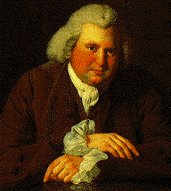| Revision as of 20:05, 13 February 2003 edit62.253.64.7 (talk)No edit summary← Previous edit | Revision as of 19:36, 20 August 2003 edit undoTarquin (talk | contribs)14,993 edits Josiah Wedgwood, COleridge & coNext edit → | ||
| Line 1: | Line 1: | ||
| <table align=right><tr><td>]<br><center>'''Erasmus Darwin'''</center></td></tr></table> | <table align=right><tr><td>]<br><center>'''Erasmus Darwin'''</center></td></tr></table> | ||
| '''Erasmus Darwin''' (],] - ],]) trained as a ] and wrote extensively on medicine and botany. Living in ] and ], ] |
'''Erasmus Darwin''' (],] - ],]) trained as a ] and wrote extensively on medicine and botany, as well as ]. Living in ] and ], ]. He was one of the founder members of the ]. | ||
| He was born near ], and studied at Cambridge and Edingurgh. He practised medicine in ] in Staffordshire for twenty years; ] invited him to be royal physician but he declined. | |||
| ⚫ | His |
||
| ⚫ | His book ''Zoonomia'' (1794-6) is widely considered to foreshadow the pre-Darwinian theories of ], and maybe even the ] formulated by his grandson ]. Another of his grandsons was ]. His experiments in ] inspired ] to write '']''. | ||
| His poetry was admired by ] and ]; and often made reference to his interests in science, for exampls botany and ]s. His most famous work of poetry was ''The Botanic Garden''. | |||
| He was in inventor of several devices, though did not patent any of them. One was a horizontal windmill, which he design for ] (who would be Charles Darwin's other grandfather). | |||
Revision as of 19:36, 20 August 2003
 |
Erasmus Darwin (December 12,1731 - April 18,1802) trained as a physician and wrote extensively on medicine and botany, as well as poetry. Living in Birmingham and Lichfield, England. He was one of the founder members of the Lunar Society.
He was born near Nottingham, and studied at Cambridge and Edingurgh. He practised medicine in Lichfield in Staffordshire for twenty years; George III invited him to be royal physician but he declined.
His book Zoonomia (1794-6) is widely considered to foreshadow the pre-Darwinian theories of Jean Baptiste Lamarck, and maybe even the theory of evolution formulated by his grandson Charles Darwin. Another of his grandsons was Francis Galton. His experiments in galvanism inspired Mary Shelley to write Frankenstein.
His poetry was admired by Coleridge and Wordsworth; and often made reference to his interests in science, for exampls botany and steam engines. His most famous work of poetry was The Botanic Garden.
He was in inventor of several devices, though did not patent any of them. One was a horizontal windmill, which he design for Josiah Wedgwood (who would be Charles Darwin's other grandfather).